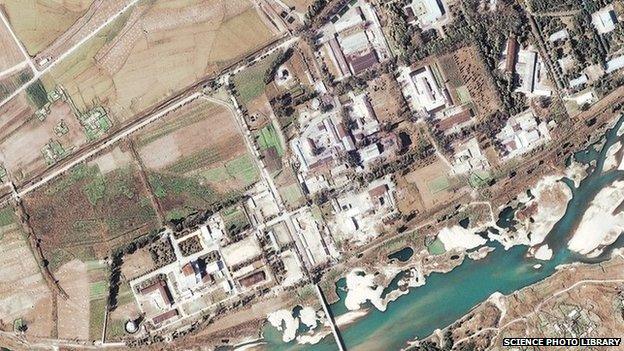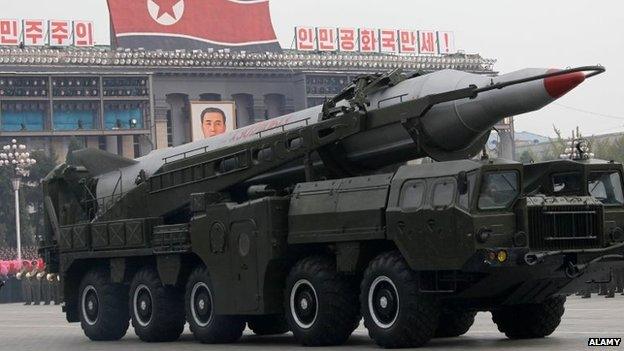North Korea 'may have restarted Yongbyon nuclear reactor'
- Published

The Yongbyon facility can produce fuel for a nuclear bomb (file picture)
A US think-tank says satellite pictures taken earlier this year suggest North Korea may have restarted one of its nuclear reactors.
The Institute for Science and International Security says, external images of the Yongbyon plant show patterns of melting snow indicating new activity.
Yongbyon's reactor was shut down in 2007 but was restarted in 2013.
Six-nation talks aimed at ending North Korea's nuclear programme have been stalled since early 2009.
The think-tank's report says that its assessment in late 2014 was that the reactor at Yongbyon, in the country's west, had been "shut down or partially shut down" but more recent images suggested the plant "may be operating at low power or intermittently".
As well as the patterns of melting snow, the satellite photos are also said to capture a stream of warm water coming out of the reactor's discharge pipeline and steam rising off the turbine.

Analysis: Jonathan Marcus, BBC diplomatic correspondent

North Korea often boasts of its "nuclear deterrent" in state-run media
This study is a powerful reminder that North Korea's nuclear weapons programme has not gone away.
It also shows the important role that independent analysts with access to civilian satellite imagery can play in helping to publicise what previously would have been top secret material available only to a handful of governments.
The winter snow and ice provides a helpful environment to reveal tell-tale signs that the Yongbyon reactor may have restarted. There's still considerable uncertainty about the scale of North Korea's nuclear arsenal.
Recently Chinese nuclear experts provided their US counterparts with a new assessment of North Korea's nuclear capabilities suggesting it may already have 20 warheads with the capacity to double this total by next year. US estimates are much more conservative.
It means that over the past 12 years Pyongyang has developed an expanding arsenal which many see as a significant threat to the region.

In 2008, North Korea walked away from six-party talks with South Korea, the US, China, Japan and Russia on its denuclearisation.
The other countries have since tried to persuade North Korea to return to the negotiating table.
Earlier this year North Korea offered to stop nuclear tests if the US stopped holding military drills with Seoul, but the offer was rejected.
North Korea has conducted three nuclear tests, in 2006, 2009 and 2013.
Also on Thursday, Russia said the North Korean leader Kim Jong-un had cancelled his plans to attend World War Two victory commemorations in Moscow.
The visit next week would have been his first trip abroad since taking power three years ago. However, a Kremlin spokesman said Mr Kim had decided to stay in North Korea due to "internal issues".